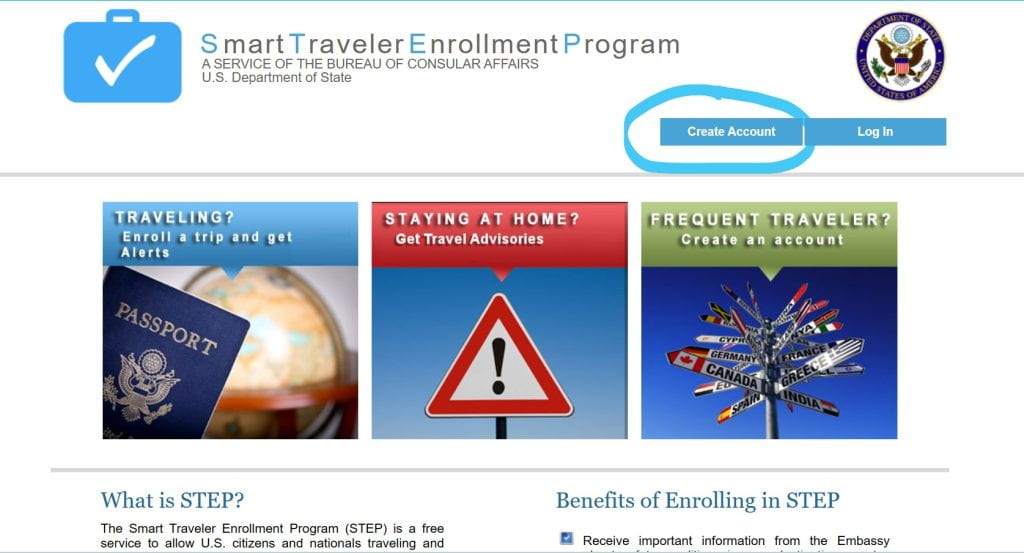Choosing a study abroad program is only the first step of actually getting to where you want to go and while your program will have advisors that can guide you through things, there may be times where you need to figure out how to do things yourself. It can get confusing sometimes, so having a checklist will do you wonders. Here’s how I did things:
- Enroll in STEP: This is a free service that allows US citizens to enroll their trip with the nearest US Embassy in whatever country you are traveling to. After creating an account, you’ll be able to log your travel dates of your program.

You will then receive any emergency notifications that the Embassy sends, from weather to safety. For example, I received ones about a potential typhoon and what safety measures to take in case I was in the affected areas.
- Research what documentation you will need for your entry and duration of your stay in your host country: passport, visa, acceptance letter from host university, etc.
THIS IS TIME SENSITIVE – as soon as you have the necessary documentation, apply for a visa. Sometimes there might not be appointments available, so you might need to send your application through the mail, and it can take time to process as well. Don’t leave this for later.
This may vary depending on what country you will be traveling to. Make sure you check with the Embassy website about what kind of visa you might need and how to acquire said visa. Your program may be able to tell you this and provide the link, but applying for the visa will be up to you. For South Korea, I had to get a D-2, single-entry visa but due to studying for over 90 days, I had to get an ARC (Alien Registration Card) with the aid of my host university. If my host university hadn’t made me aware of this, I probably wouldn’t have realized that I needed another identification while studying.
- Make a packing list that takes into account all seasons that you will be in the other country.
I saw other students from warm weather countries who were unprepared for the Korean winter and who had to buy winter clothing last minute – try not to do this. Researching average weather and temperature for the duration of your stay will be benefit you greatly.
Also, make sure that you have some cash in the program country’s currency. This can usually be done online at your bank where you can order X amount of cash from your account in that currency. Other students experienced some difficulty in South Korea where their card didn’t work and they couldn’t figure out where to exchange currency, so doing this beforehand and bringing it with you would be easier. Getting a travel credit card would be helpful as well, if you don’t like to use cash for everything or want another method of payment. Travel credit cards are made to work abroad (i.e. locked-in exchange rates, no foreign transaction fee) while regular credit cards usually have these extra expenses when traveling abroad.
- Check your medication: most medications that you can get over-the-counter in the U.S. are available in other countries OTC as well (cough medicine, headache medicine, etc.) however you should always check to make sure.
Prescription medication on the other hand, you MUST check – sometimes the medication might be banned or heavily regulated and you might need to go to the doctors in your program country to get a prescription for it there.
- Check your travel: sometimes, programs might have a group flight that may be cheaper than other flights, but it never hurts to check.
Do you have to be in country by a specific date? Is your host university in a different city than the airport? How are you getting there? Can you move into the dorms right away or will you need to stay at a hotel for a night or two before you’re allowed to?
- Phone: unlock your phone to allow for other SIM cards. Download any apps that may be helpful (language translation, maps, messaging, booking a taxi/buying bus or train tickets, any school apps, etc.).
Depending on how long you are studying abroad (a semester or yearlong), you may not need to unlock your phone if your provider has an international plan. These plans are usually available for only a couple months at most, so it is likely that you will need to think about unlocking your phone.
Please be aware that your phone may not accept a SIM card from your host country. Despite unlocking my phone, for some reason it never liked Korean SIM cards regardless of where I got it from. I’ve been using my US SIM for the duration of my stay and have been incurring international data usage fees. If this isn’t feasible for you, I would suggest checking to make sure your phone is actually unlocked fully with your provider, getting a new phone in the US if your phone is older, or getting a temporary phone in your host country.